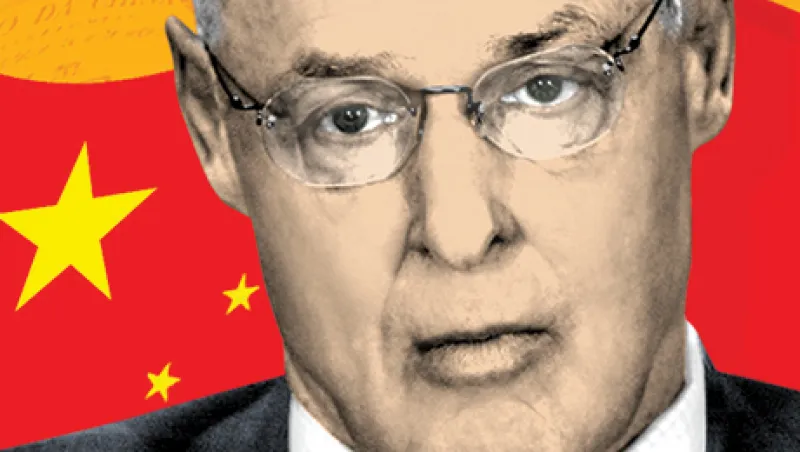Rather than take it easy after putting in 32 years at investment bank Goldman Sachs and serving as U.S. Treasury secretary from 2006 to 2009, Henry (Hank) Paulson Jr. is dedicating his time to the economy, the environment and China. The former Goldman CEO chairs the Paulson Institute at the University of Chicago, an independent think tank he established in 2011 to promote U.S.-China relations. Having dealt with Chinese officials and business leaders often in his career, Paulson has a unique window on the country’s modernization. He expresses cautious optimism about the slate of reforms being pursued by President Xi Jinping, who took over as Communist Party head in 2012.
Paulson, 68, believes China must open its capital markets as much as possible. He argues that a bilateral investment treaty between the U.S. and China — talks restarted in February — is key because reformers will use it to allow foreign competition. Senior Writer Imogen Rose-Smith recently caught up with Paulson.
Why China?
Almost every important issue is easier to solve if the U.S. and China are working together. And these issues are much harder to solve if we are working at cross-purposes. I am focused on economic and environmental issues. China is going to be a big driver of those outcomes globally. It is very much in the U.S. interest to work on programs that enhance economic and environmental progress in China.
Is progress on the quality of the environment really possible for China? The U.S. and China are the biggest users of energy, the biggest emitters of carbon, and if the two of us are working together, we have a much better likelihood of tackling the environmental challenges we have globally. If you had looked forward ten years ago and knew all the things China was going to invest in when it comes to different sources of energy — emerging clean technologies and closing down dirty manufacturing and power plants — and asked would their air and water situation be as dire as it is today, I wouldn’t have predicted it. Their efforts in this area have been blown away by growth. China needs to focus on investing in high-quality growth that is sustainable. What is another point of GDP worth if dirty air is killing people
Is China’s economic growth sustainable Is the country in a credit bubble? The next eight to ten years are going to be crucial. The bad news is that China’s economic growth model has run out of steam. They need a model with more emphasis on domestic-led growth and less on growth created by investment and exports. They need to move to a system that is more reliant on markets than bureaucratic decision making when it comes to the economy. It’s a lot easier said than done, in a $9 trillion economy, to figure out how to change the model. The good news is you’ve got a leadership that understands the problem and is determined to deal with it.
In every economy, as long as you’ve got banks, you’re going to have excesses and credit bubbles and financial crises from time to time. The key is to keep excesses from building and avoid a big crisis that seriously harms the economy. China absolutely has bad debts, and that is a significant problem. But today the nation has the financial capacity and expertise to manage this problem. Bad debts are at the municipal level and with the state-owned enterprises. They need to fix the flaws in the system, or they will have a major crisis a few years from now. They need to transform how the banks are run, how the state-owned enterprises are run and how the government works with each of them. They need a new system of municipal finance that is not reliant on real estate sales.
Did the U.S. banking crisis set back financial reform in China? It gave the antireformers a strong argument, but the facts are pretty clear today. Our financial system in the U.S. is not without problems, but if you look across the board it is the broadest, deepest, most efficient system in the world, and that is a strong competitive advantage. The Chinese leaders understand the problems with their own system. When I’m talking to them, I’m not hearing them say, “You guys had a financial crisis, so we don’t need to reform our system.”
How confident are you that China will open up its markets? I am cautiously optimistic, but we shouldn’t underestimate the strength of vested interests that are opposing these reforms. It all comes down to competition. Will they let the private sector compete with state-owned enterprises on a level playing field in key industries Will they let foreign companies do so A key test will be how quickly they reform the financial system and let best-in-class global institutions play a greater role. These bank joint ventures haven’t been — and won’t be — successful. If you want world-class financial markets, you need world-class financial institutions.






